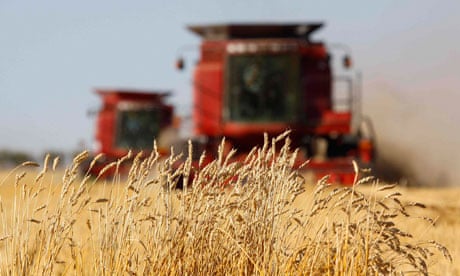Government intervention may be needed to burst the huge bubble that has developed in the price of commodities such as food staples and oil, a UN report says .
Prices have rocketed in response to dysfunctional commodities markets, according to the report, which also disputes the view of many senior economists and central bankers that commodity prices have jumped as a result of a surge in demand.
"The changing role of commodity markets, which are turning into financial markets, has enormous repercussions for the economy," said one of the report's authors – Heiner Flassbeck, a director at the UN conference on trade and development (Unctad).
"The possibility of allowing governments' direct intervention in the physical and financial markets needs to be considered," the study concluded.
Investors are encouraged to behave like a herd, says the report, with few incentives to arbitrage or bet against the tide of rising prices. Without checks and balances in the system, investors create price bubbles that put many basic foodstuffs out of the reach of millions in the developing world.
Oil may be as much as 20% over valued while maize, the staple food of many developing world economies, is subject to wild swings in price.
The report follows a similar investigation by Christian Aid, which urged world leaders to commission a review of commodity markets after it found that a huge influx of profit seeking investors distorted the market. The charity blamed pension funds and other long term investors for pushing up prices by seeking high returns from investment in commodities' markets.
In April, the World Development Movement blamed Barclays Capital, the investment banking arm of the high street bank, for driving up prices. BarCap is the UK's biggest player in food commodity trading, and one of the top three banking players along with Goldman Sachs and Morgan Stanley. BarCap has pioneered the creation of derivatives that allow pension funds and other investors traditionally barred from commodities exchanges to bet on food prices. Nearly $270bn is invested in derivatives that follow commodity prices, up from $90bn in 2005, according to Unctad.
A separate report by the UN special rapporteur on the right to food, Olivier De Schutter, argued that the appetite for investments in commodities was even higher. He found that commodity index funds rose from $13bn (£7.9bn) in 2003 to $317bn by 2008. While there are no definitive figures on how those index funds break down, one estimate suggested their holdings in agricultural commodity markets rose from about $3bn to more than $55bn over that period.
Using these new derivative products, pension funds, especially in the US, have invested large slices of their overall portfolio in commodities as it has become more difficult to generate above average returns from more traditional sources of income, such as stock and bond markets.
Unctad, which commissioned the report, said the efficient market hypothesis that many economists believe regulates trading in commodity markets has broken down.
"If the efficient market hypothesis were to apply, commodity price developments would reflect nothing but information on fundamentals. However, this study shows that the hypothesis does not apply to the present commodity futures markets," the report says.
"Another major factor is the financialisation of commodity markets, which has played a significant role in price developments in recent years," the report says. Its importance increased steadily after 2004, as reflected in rising volumes in commodity derivatives markets – both at exchanges and over the counter (OTC). "This phenomenon is a serious concern, because the activities of financial participants tend to drive commodity prices away from the levels justified by market fundamentals, with negative effects on producers and consumers."
Traders interviewed by the report's authors said they were encouraged to join other traders buying commodities by a lack of transparency over what was happening in the market. Traders are unaware of other buyers and their trading positions, information that can prove crucial when deciding to buy or sell a commodity.
They said the situation in the EU was worse than the US, where regulators produced weekly reports on rule changes and trends. Largely unregulated over-the-counter markets, which allow individual institutions to trade with each other away from the main markets, also needed greater transparency, it said.
Unctad said a transaction tax on commodity trading, which could raise billions for investment in developing countries, would slow the pace of financial markets, limiting the scope for misinformation.
Commodity prices reached a record in 2008 as traders anticipated a rapid recovery from the credit crunch of 2007, but the market crashed after the collapse of Lehman Brothers. In the last six months prices have soared again, though not yet to 2008 levels. Critics of commodity traders fear a slowdown in the global economy could trigger a sell-off in commodity derivatives, triggering exaggerated falls in prices.
